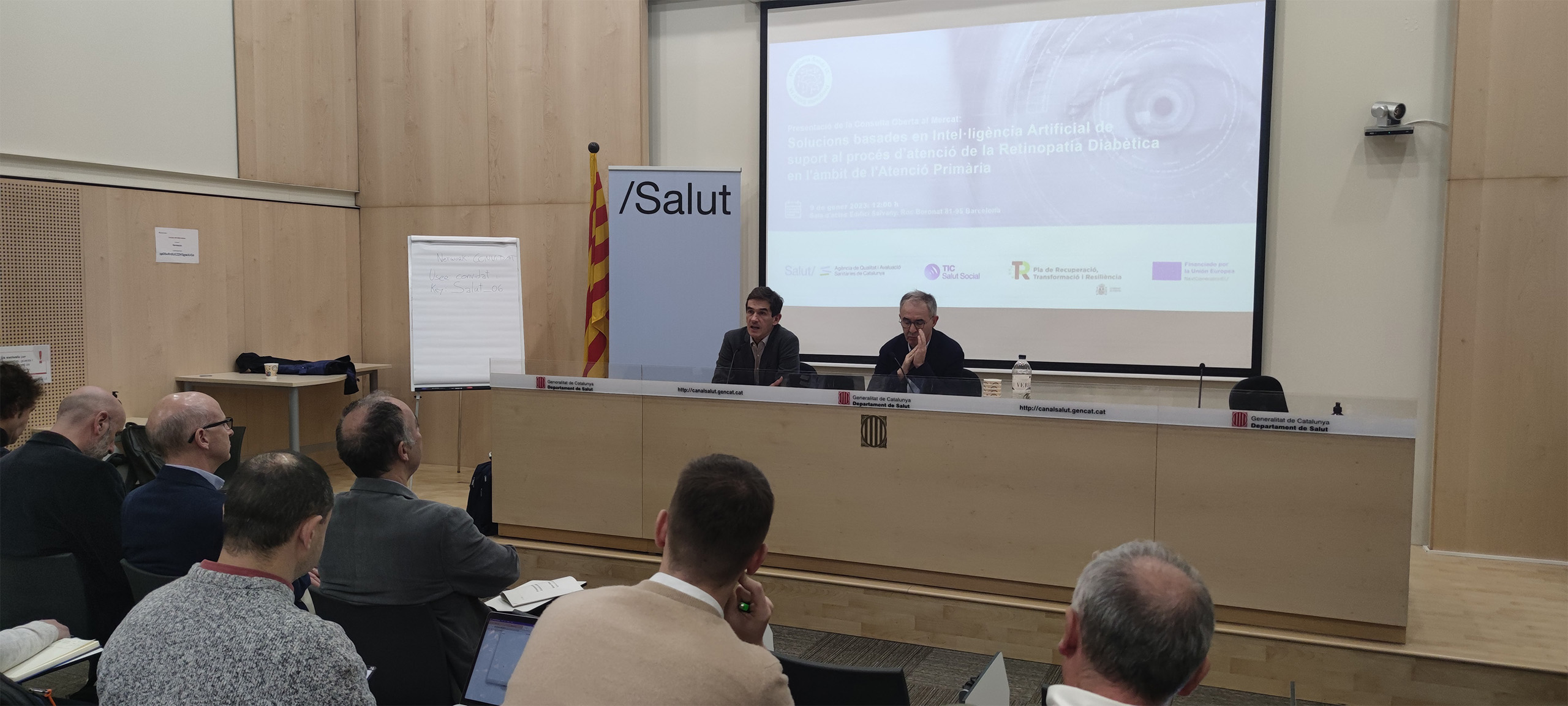The terms and conditions for the open market consultation on AI Solutions for Diabetic Retinopathy in Primary Care have been published
Entities interested in participating have until 19 January (10 calendar days after its publication) to send the documentation indicated in the terms and conditions and in the annexes.
The Catalan Agency for Health Quality and Assessment (AQuAS) has published the terms and conditions for the open market consultation in order to check the commercial availability, or the feasibility in the market, of AI-based solutions that can be integrated into the treatment process for Diabetic Retinopathy in the Primary Care area of the Integrated Public Healthcare System of Catalonia (SISCAT).
The consultation is part of the initiative promoted by the Health/IA Programme to tackle diabetic retinopathy, and is financed by the European Union’s NextGenerationEU programme, through the Recovery, Transformation and Resilience Plan (PRTR).
The terms and conditions for the consultation and the different phases of the initiative were officially presented on 9 January at an event attended by Joan Guanyabens and Carlos Gallego, Directors of the Health/IA Programme; Àlex Guarga, Manager of Operational Planning and Assessment of the Healthcare Area of Catsalut; Dr Josep Maria Caminal, Head of the Ophthalmology Department of the Hospital de Bellvitge; Ramon Maspons, Strategic Director of the Departmental Committee for Innovation and Transformation of AQuAS, and Ramon Roman, Director of the Public Programme of Data Analytics for Research and Innovation in Health (PADRIS) of AQuAS. The event can be re-watched in the following video:
AI solutions for diabetic retinopathy
Diabetic retinopathy is a neurovascular complication that affects people with type 1 and type 2 diabetes and can lead to a reduced or complete loss of vision. It is currently the second cause of blindness in Spain in global terms and the first in young adults of active working age. In Catalonia, it affects an estimated 8% of the population over 15 years of age and 20% of people over 65 years of age, which represents an estimated volume of more than 630,000 cases. These figures were shared by Dr Josep Maria Caminal during the presentation of the project, in which he also spoke about the classification of the disease, treatment and care needs, emphasising the importance of early detection as a means of improving the prognosis.
According to Dr Caminal, the main benefits that are expected to be achieved through the introduction of AI are to improve diagnosis, reduce the number of treatments related to lesions caused by the disease, reduce interconsultations with ophthalmologists, and avoid the displacement of the population to healthcare centres.
Preliminary market consultation process and technical aspects
The consultation is addressed to all interested natural or legal persons, both public and private, from any country as well as individually or jointly through a group of persons or entities.
Entities interested in participating have until 19 January (10 calendar days after its publication) to send the documentation indicated in the terms and conditions and in the annexes.
All the documentation related to this consultation is published in the AQuAS contracting profile, which can be found on the Public Contracting Services Platform by clicking on this link.
For the purposes of testing future solutions on a platform, the Health/IA Programme offers a secure environment where the use of data outside the health system is not allowed. The available datasets contain more than 400,000 cases with 17 clinical variables, more than 1.2 million diagnoses with 6 different categories of diabetic retinopathy and nearly 500,000 retinographs, among others.

More news
-
26 JANUARY 2024

SISCAT and research center managers delve into the field of artificial intelligence in health
About sixty managers and senior representatives from the centers of the Catalan public healthcare ...
26 JANUARY 2024 -
20 OCTOBER 2023

The results of the preliminary market consultation for the medicine information challenge have been published
The Health Quality and Assessment Agency of Catalonia (AQuAS) has published the Final report ...
20 OCTOBER 2023 -
19 JULY 2023

The Department of Health begins the market consultation process for the development of AI-based solutions to provide information on medicines to the public
Within the framework of the Health/AI programme, the conditions of the market consultation concerning ...
19 JULY 2023



